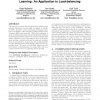114
click to vote
AAAI
1993
15 years 3 months ago
1993
This paper analyzes the complexity of on-line reinforcement learning algorithms, namely asynchronous realtime versions of Q-learning and value-iteration, applied to the problem of...
122
click to vote
IJCAI
2003
15 years 3 months ago
2003
We investigate the problem of non-covariant behavior of policy gradient reinforcement learning algorithms. The policy gradient approach is amenable to analysis by information geom...
124
click to vote
NIPS
2004
15 years 3 months ago
2004
Successful application of reinforcement learning algorithms often involves considerable hand-crafting of the necessary non-linear features to reduce the complexity of the value fu...
126
click to vote
NIPS
2008
15 years 3 months ago
2008
In this paper we consider approximate policy-iteration-based reinforcement learning algorithms. In order to implement a flexible function approximation scheme we propose the use o...
130
click to vote
ECML
2003
Springer
15 years 7 months ago
2003
Springer
Due to the unavoidable fact that a robot’s sensors will be limited in some manner, it is entirely possible that it can find itself unable to distinguish between differing state...
144
click to vote
ATAL
2005
Springer
15 years 7 months ago
2005
Springer
This paper is concerned with how multi-agent reinforcement learning algorithms can practically be applied to real-life problems. Recently, a new coordinated multi-agent exploratio...
141
click to vote
CIA
2007
Springer
15 years 8 months ago
2007
Springer
Abstract. In this paper we compare state-of-the-art multi-agent reinforcement learning algorithms in a wide variety of games. We consider two types of algorithms: value iteration a...
132
click to vote
ATAL
2007
Springer
15 years 8 months ago
2007
Springer
It is known that the complexity of the reinforcement learning algorithms, such as Q-learning, may be exponential in the number of environment’s states. It was shown, however, th...
126
click to vote
ATAL
2007
Springer
15 years 8 months ago
2007
Springer
Temporal difference reinforcement learning algorithms are perfectly suited to autonomous agents because they learn directly from an agent’s experience based on sequential actio...
126
click to vote
ATAL
2007
Springer
15 years 8 months ago
2007
Springer
Reinforcement learning is a popular and successful framework for many agent-related problems because only limited environmental feedback is necessary for learning. While many algo...

